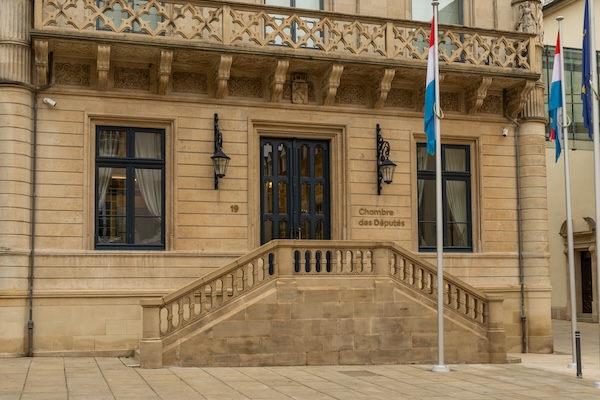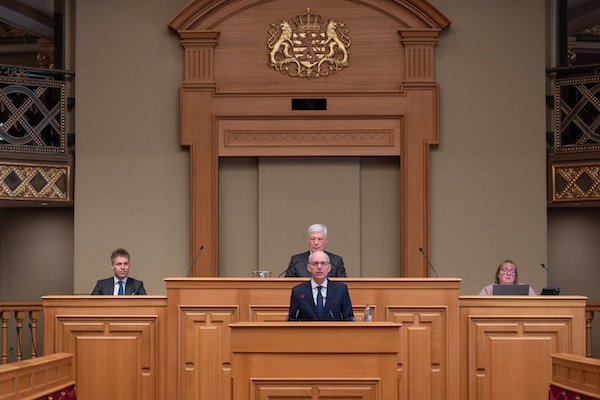 Luxembourg Chamber of Deputies;
Credit: Ali Sahib, Chronicle.lu
Luxembourg Chamber of Deputies;
Credit: Ali Sahib, Chronicle.lu
Luxembourg is a parliamentary democracy in the form of a constitutional monarchy. It is the world’s only grand duchy and, as of October 2025, will be headed by Grand Duke Guillaume of Luxembourg. His father, Grand Duke Henri, was the constitutional head of state from 2000 to 2025.
As a parliamentary democracy, the government is elected by the members of the parliament, who in turn are elected by the people. Prime Minister Luc Frieden is the current head of Luxembourg’s government.
In Luxembourg, the powers of the monarchy and the state are clearly separated. The elected government is accountable to the Chamber of Deputies (Parliament) and to the people. Legislative power primarily resides with the parliament, while executive power is formally exercised by the Grand Duke and the government, which implement and enforce laws.
Legislative (Parliamentary or National) Elections
Legislative elections are held every five years. 60 members of the Chamber of Deputies (deputies or MPs) are elected using the system of proportional representation. Voting is by secret ballot and is compulsory for everyone on the electoral list. The current Chamber of Deputies was elected in October 2023 and the next parliamentary elections are due to take place in October 2028.
For legislative elections, the country is divided into four electoral constituencies, with a different number of deputies elected in each one: South (23), Centre (21), North (9) and East (7).
Once the official results of the election are known, a government is formed and then presented and sworn in by the Grand Duke.
To be eligible to vote in the legislative elections, one must be over the age of eighteen and be of Luxembourgish nationality.
Municipal (Local) Elections
Municipal elections take place every six years. Municipal councils are elected directly by the inhabitants of each municipality. The last municipal elections in Luxembourg took place in 2023, with the next ones scheduled for 2029. The municipal council consists of a mayor (known in Luxembourgish as “Buergermeeschter” for a man or “Buergermeeschterin” for a woman), two or more aldermen (“Schäffen”; the number depends on the municipality’s size) and several councillors. They manage the day to day running of the municipality. The exact number of aldermen and councillors in each municipality depends on the number of inhabitants.
There are two different municipal electoral systems in Luxembourg, based on the number of people living in the municipality. Municipalities with fewer than 3,000 inhabitants use the system of majority, in which voters cast their votes by ticking the box next to the name of their chosen candidates. Municipalities with more than 3,000 inhabitants use the proportional representation system, in which voters can cast up to two votes for individual candidates or vote for an entire list.
The municipal councils are composed as follows:
- seven members in municipalities with a population of 999 or less;
- nine members in municipalities with 1,000 to 2,999 inhabitants;
- eleven members in municipalities with 3,000 to 5,999 inhabitants;
- thirteen members in municipalities with 6,000 to 9,999 inhabitants;
- fifteen members in municipalities with 10,000 to 14,999 inhabitants;
- seventeen members in municipalities with 15,000 to 19,999 inhabitants;
- nineteen members in municipalities with 20,000 or more inhabitants;
- 27 members in the City of Luxembourg municipal council.
To vote in municipal elections, one must be over the age of eighteen and be registered on the electoral list. Non-Luxembourgish residents of the Grand Duchy can also register to vote, following a 2022 law change that first applied in the 2023 municipal elections. Both Luxembourgish and non-Luxembourgish citizens can stand for election. As with legislative elections, voting is compulsory for those on the electoral list.
European Elections
Every five years, Luxembourg elects six representatives (MEPs) to the European Parliament. For European elections, Luxembourg constitutes a single electoral constituency. Luxembourgish nationals and EU citizens from other countries, residing in Luxembourg, aged eighteen or over, are eligible to vote. Voting is compulsory for those who are on the electoral list. The last European elections were held in 2024.
At the time of writing, Luxembourg’s MEPs for 2024 to 2029 were: Marc Angel (LSAP - Group of the Progressive Alliance of Socialists and Democrats in the European Parliament); Charles Goerens (DP - Renew Europe Group); Fernand Kartheiser (ADR - non-attached MEP); Martine Kemp (CSV - European People's Party Group); Tilly Metz (Déi Gréng - Greens/European Free Alliance Group); Isabel Wiseler-Lima (CSV - European People's Party Group).
Referendums
A referendum is called when the government requires the approval of its citizens to modify or change a law or part of the constitution. Voting is mandatory for those on the electoral list. The Grand Duchy held its most recent referendum in 2015, during which voters were asked three questions: whether the voting age should be lowered from eighteen to sixteen; whether foreign residents should be granted the right to vote in legislative elections (provided they had lived in Luxembourg for at least ten years and had previously voted in European or municipal elections in Luxembourg); whether the terms of government minister should be limited to ten years. The majority of voters rejected all three proposals, responding “No” to each.
Chamber of Deputies (Parliament)
In Luxembourg, legislative power is shared between the Chamber of Deputies, the government and the Council of State. While the Chamber of Deputies and the government each have distinct roles within the parliamentary system, they work together in the legislative process.
The Chamber of Deputies is the main legislative body and votes on government and parliament bills. Members propose and debate legislation and vote to approve or reject the proposed bill. It may only make a resolution if the majority of its members is present. The Chamber sits in the Hôtel de la Chambre, situated near the Grand Ducal Palace in Luxembourg-Ville. Its sessions are usually open to the public. Chamber deputies are typically divided into two main groups, "the majority" who are members of the government parties and "the opposition", which includes all other deputies.
The 60 members of the current Chamber of Deputies, elected by the people, represent seven different parties. The Christian Social People's Party (CSV) has the largest representation (21), followed by the Democratic Party (DP) with fourteen deputies. The Luxembourg Socialist Workers’ Party (LSAP) is the third largest party with twelve deputies. The remainder are made up of five Alternative Democratic Reform Party (ADR) members, four from the Greens (Déi Gréng), two from the Pirate Party and two from the Left (Déi Lénk).
The plenary sessions of the Chamber of Deputies are chaired by a president, often referred to as the "first citizen of the country". The president represents the Chamber of Deputies, leads debates and ensures the rules of procedure are followed. The president also heads the Conference of Presidents, which is responsible for organising the work of the Chamber and represents the Chamber at national and international events. Claude Wiseler (CSV) is the current and 40th President of the Chamber of Deputies of Luxembourg. He has held the position since 21 November 2023.
Government
The government, led by the Prime Minister, is responsible for running the country's affairs, as well as upholding and implementing laws, regulations and decrees, and maintaining public order. It submits government bills to the Chamber of Deputies for approval.
Luxembourg’s present government is a coalition of two of the country’s biggest and oldest political parties, the CSV (centre-right) and the DP (liberal). It is composed of Prime Minister Luc Frieden (CSV), Deputy Prime Minister Xavier Bettel (DP) and thirteen ministers, each of whom is responsible for one or several ministerial departments.
The current government members are:
- Luc Frieden (CSV), Prime Minister;
- Xavier Bettel (DP), Deputy Prime Minister, Minister for Foreign Affairs and Foreign Trade, Minister for Development Cooperation and Humanitarian Affairs (he also served as Luxembourg’s Prime Minister from 2013 to 2023);
- Martine Hansen (CSV), Minister of Agriculture, Food and Viticulture, Minister for Consumer Protection;
- Claude Meisch (DP), Minister of Education, Children and Youth, Minister of Housing and Spatial Planning;
- Lex Delles (DP), Minister of the Economy, SMEs, Energy and Tourism;
- Yuriko Backes (DP), Minister of Defence, Minister for Gender Equality and Diversity, Minister for Mobility and Public Works;
- Max Hahn (DP), Minister for Family Affairs, Solidarity, Living Together and Reception of Refugees;
- Gilles Roth (CSV), Minister of Finance;
- Martine Deprez (CSV), Minister of Health and Social Security;
- Léon Gloden (CSV), Minister for Home Affairs;
- Stéphanie Obertin (DP), Minister for Digitalisation, Minister for Research and Higher Education;
- Georges Mischo (CSV), Minister of Sport, Minister of Labour;
- Serge Wilmes (CSV), Minister of the Environment, Climate and Biodiversity, Minister for the Civil Service;
- Elisabeth Margue (CSV), Minister of Justice, Minister Delegate to the Prime Minister for Media and Connectivity, Minister Delegate to the Prime Minister for Relations with Parliament;
- Eric Thill (DP), Minister for Culture, Minister Delegate for Tourism.
The members of the government meet on a weekly basis in the Government Council (Cabinet) to discuss items on the agenda, including bills put forward to the Chamber of Deputies. All matters submitted to the Grand Duke must be deliberated beforehand at the Government Council.
Other Political Parties
Non-parliamentary political parties in Luxembourg include the Communist Party of Luxembourg (KPL), Fokus, the Conservatives (Déi Konservativ) and Volt.
Council of State
The Council of State is an independent institution, composed of 21 councillors appointed by the Grand Duke, of whom at least eleven must hold law degrees. All bills and proposals, submitted by either the government or the Chamber of Deputies, require the opinion of the Council of State. It considers whether the draft texts comply with the country’s Constitution, international conventions and the rule of law.
Judiciary
Luxembourg’s judicial system is independent of the legislative (parliamentary) and executive (Grand Duke and government) branches of power. It is responsible for interpreting and applying the law and ensuring that justice is administered fairly. Judicial power is exercised by various courts and tribunals, including the Constitutional Court, which is composed of nine members and ensures that laws comply with the Constitution.
 Luxembourg Chamber of Deputies;
Luxembourg Chamber of Deputies;
Credit: Ali Sahib, Chronicle.lu








